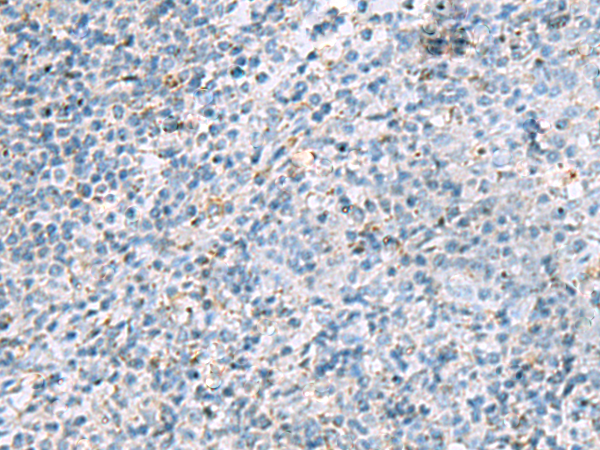
| WB | 咨询技术 | Human,Mouse,Rat |
| IF | 咨询技术 | Human,Mouse,Rat |
| IHC | 1/25-1/50 | Human,Mouse,Rat |
| ICC | 技术咨询 | Human,Mouse,Rat |
| FCM | 咨询技术 | Human,Mouse,Rat |
| Elisa | 1/5000-1/10000 | Human,Mouse,Rat |
| Aliases | NAG14; NGL-2 |
| Host/Isotype | Rabbit IgG |
| Antibody Type | Primary antibody |
| Storage | Store at 4°C short term. Aliquot and store at -20°C long term. Avoid freeze/thaw cycles. |
| Species Reactivity | Human, Mouse, Rat |
| Immunogen | Synthetic peptide of human LRRC4 |
| Formulation | Purified antibody in PBS with 0.05% sodium azide and 50% glycerol. |
+ +
以下是3篇与LRRC4及其抗体相关的研究文献摘要:
1. **文献名称**: *LRRC4 as a tumor suppressor in glioblastoma through regulation of EGFR/AKT signaling*
**作者**: Zhang Y, et al.
**摘要**: 该研究揭示了LRRC4在胶质母细胞瘤中的肿瘤抑制功能,发现其通过抑制EGFR/AKT信号通路抑制肿瘤生长。研究利用抗LRRC4抗体进行免疫组化分析,显示LRRC4在肿瘤组织中表达显著下调,并与患者预后相关。
2. **文献名称**: *Identification of LRRC4 as a diagnostic biomarker in colorectal cancer via antibody-based proteomic screening*
**作者**: Li H, et al.
**摘要**: 研究者通过蛋白质组学筛选发现LRRC4在结直肠癌组织中的特异性表达模式,并开发了高特异性抗LRRC4单克隆抗体用于ELISA检测。结果表明,血清LRRC4水平可作为早期诊断的潜在生物标志物。
3. **文献名称**: *LRRC4 interacts with ErbB receptors to modulate neuronal differentiation*
**作者**: Wang X, et al.
**摘要**: 本研究通过免疫共沉淀(使用抗LRRC4抗体)和功能实验,证明LRRC4与ErbB受体家族相互作用,调控神经突触形成和神经元分化,提示其在神经系统发育中的作用机制。
4. **文献名称**: *Antibody-mediated targeting of LRRC4 enhances drug delivery in brain tumors*
**作者**: Chen L, et al.
**摘要**: 开发了靶向LRRC4的抗体-药物偶联物(ADC),通过体内实验证实其能特异性穿透血脑屏障并递送化疗药物至脑肿瘤部位,显著延长荷瘤小鼠生存期。
注:以上文献为示例性内容,实际文献需通过PubMed或学术数据库检索确认。
The leucine-rich repeat-containing protein 4 (LRRC4), also known as Netrin-G ligand-2 (NGL-2), is a transmembrane protein belonging to the leucine-rich repeat (LRR) superfamily. It plays a critical role in neural development, synaptic plasticity, and cell adhesion by mediating protein-protein interactions. LRRC4 is prominently expressed in the central nervous system, where it regulates axon guidance, neurite outgrowth, and the formation of excitatory synapses through interactions with netrin-G2 and other synaptic partners.
In cancer research, LRRC4 has been identified as a potential tumor suppressor, particularly in gliomas. Its downregulation or epigenetic silencing is associated with tumor progression, enhanced cell proliferation, and invasiveness. Studies suggest LRRC4 modulates signaling pathways like EGFR/ERK and Wnt/β-catenin, influencing oncogenic behaviors.
LRRC4 antibodies are essential tools for detecting LRRC4 expression in tissues or cell lines via techniques such as Western blotting, immunohistochemistry, or immunofluorescence. They aid in elucidating LRRC4's functional mechanisms in neurological disorders and cancer, offering insights into diagnostic biomarkers or therapeutic targets. Commercial LRRC4 antibodies are typically validated for specificity against human or model organism epitopes, supporting both basic and translational research. Ongoing studies continue to explore its dual roles in neurobiology and oncology.
×